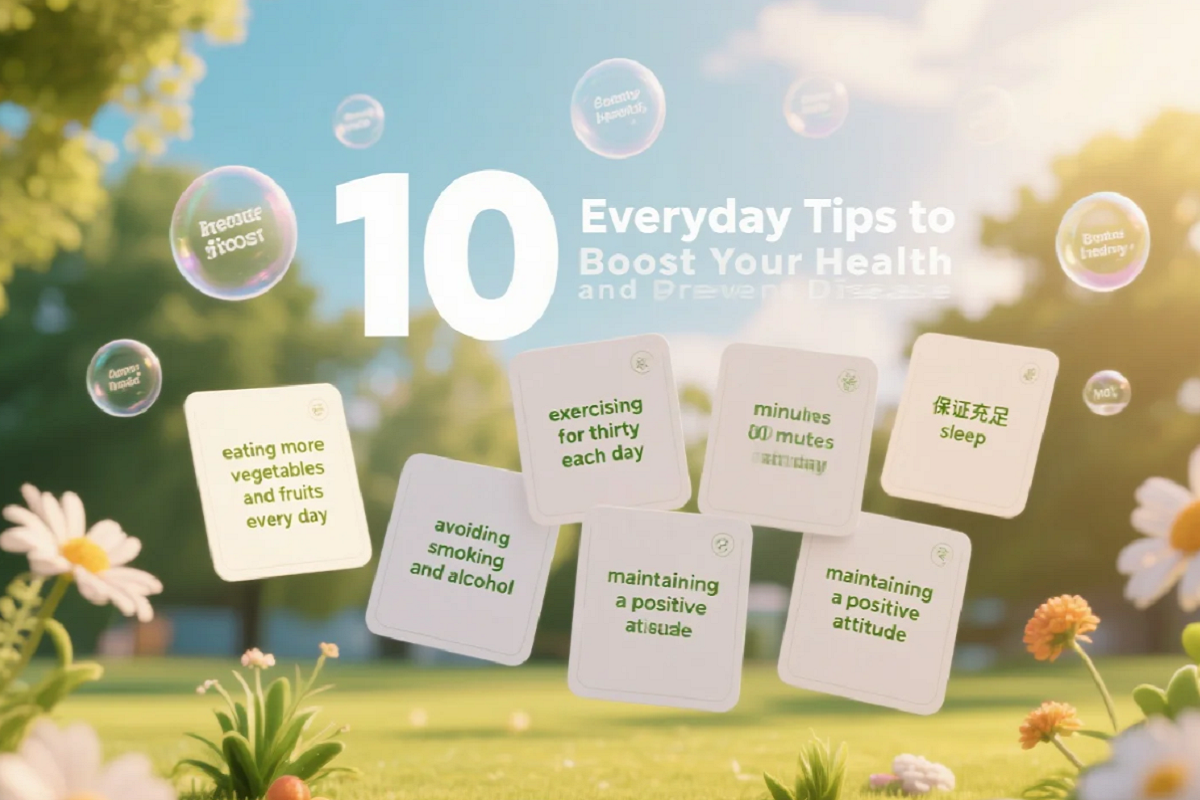7 Powerful Habits That Can Prevent Future Health Issues
-
94
- 21 Mar, 2025

Maintaining good health is a priority for many, but the reality is that not all of us make proactive choices to preserve our well-being. Many of the health issues we face later in life are the result of poor habits accumulated over time. However, adopting just a few simple, healthy habits can significantly reduce your risk of future health problems. The great thing is, it’s never too late to turn things around.
In this article, we’ll explore seven powerful habits that can help prevent future health issues. From exercise routines to nutritional choices, these habits are simple, effective, and easy to incorporate into your daily life. Let’s dive in.
The Power of Prevention: Why Your Habits Matter
Before we dive into the specifics, it's important to understand that our lifestyle choices today will shape our future health. Whether it's our diet, exercise, sleep, or stress levels, every action we take today has a ripple effect on our long-term well-being. As they say, prevention is better than cure—and when it comes to health, this couldn't be more true.
Habit #1: Regular Physical Activity
Why Exercise is Crucial for Future Health
One of the most effective ways to prevent health problems is to stay active. Exercise is not just about building muscle or burning calories—it’s about improving your overall health. Regular physical activity has been linked to a lower risk of developing chronic conditions such as heart disease, diabetes, obesity, and even some types of cancer.
What You Can Do
Strive for at least 30 minutes of moderate exercise, like brisk walking, cycling, or swimming, five days a week. You don't have to commit to long hours at the gym to see benefits. Even small changes, like taking the stairs instead of the elevator or walking instead of driving short distances, can add up.
Key Benefits:
- Improves cardiovascular health
- Boosts metabolism
- Enhances mood and mental health
- Increases lifespan
Habit #2: Eating a Balanced Diet
Fueling Your Body for the Future
The food you eat is one of the most important factors influencing your health. A diet high in processed foods, refined sugars, and unhealthy fats can lead to a variety of health problems, including obesity, diabetes, and heart disease. On the other hand, a diet rich in whole foods like vegetables, fruits, whole grains, and lean proteins can protect you from these risks.
What You Can Do
Opt for a well-balanced diet that includes:
- Plenty of vegetables and fruits (aim for at least five servings a day)
- Whole grains like quinoa, oats, and brown rice
- Lean protein sources like chicken, fish, and plant-based alternatives like tofu and beans
Opt for healthy fats found in olive oil, nuts, and avocados, while reducing or avoiding processed foods, sugary beverages, and too much alcohol. Drink plenty of water throughout the day, and consider meal prepping to avoid unhealthy food choices when you're in a rush.
Key Benefits:
- Supports a healthy immune system
- Reduces the risk of chronic diseases
- Aids digestion and weight management
Habit #3: Getting Quality Sleep
Why Sleep Is Your Health’s Best Friend
Sleep is often the most overlooked aspect of health, but it’s just as important as diet and exercise. Chronic sleep deprivation can lead to an increased risk of heart disease, diabetes, obesity, and weakened immune function. It also affects mental clarity, mood, and memory, making it harder to concentrate and be productive.
What You Can Do
Make it a goal to get 7 to 9 hours of restful sleep every night. Create a relaxing bedtime routine that includes winding down for at least 30 minutes before sleep. Avoid caffeine, alcohol, and heavy meals close to bedtime, as they can disrupt your sleep cycle. Create a sleep-friendly atmosphere in your bedroom by keeping it cool, quiet, and dark.
Key Benefits:
- Boosts brain function and memory
- Strengthens the immune system
- Reduces stress and anxiety
Habit #4: Managing Stress Effectively
The Impact of Stress on Your Health
While some stress is inevitable, chronic stress can wreak havoc on your body, leading to high blood pressure, anxiety, depression, and even digestive issues. Over time, unmanaged stress can contribute to the development of serious health conditions like heart disease and stroke.
What You Can Do
Incorporate stress management techniques into your daily routine. Practices like meditation, deep breathing exercises, yoga, or journaling can help lower stress levels. Additionally, learning to say no and setting healthy boundaries in both your personal and professional life can help reduce stress triggers.
Key Benefits:
- Reduces risk of heart disease and high blood pressure
- Improves mental clarity and focus
- Enhances emotional well-being
Habit #5: Staying Hydrated
Hydration: The Key to Longevity
Water is the foundation of life. Drinking enough water each day is essential for nearly every bodily function, from digestion and nutrient absorption to maintaining body temperature. Chronic dehydration can lead to headaches, kidney stones, and poor skin health, among other issues.
What You Can Do
Aim to drink at least 8 cups of water a day, or more if you're physically active or live in a hot climate. If plain water feels too boring, try infusing it with fresh fruits or herbs like cucumber or mint for added flavor. Keep a water bottle with you all day to help you remember to stay hydrated.
Key Benefits:
- Supports digestion and nutrient absorption
- Improves skin appearance
- Enhances cognitive function
Habit #6: Avoiding Harmful Habits
The Dangers of Smoking and Excessive Drinking
Habits like smoking and drinking alcohol in excess are major risk factors for a variety of serious health conditions, including lung cancer, liver disease, and heart problems. Eliminating these harmful habits from your lifestyle can significantly improve your health and longevity.
What You Can Do
If you smoke, seek support to quit—there are numerous resources available to help you through the process. If you drink alcohol, aim to keep it in moderation. The CDC suggests limiting alcohol to one drink per day for women and two for men.
Key Benefits:
- Reduces the risk of cancer and liver disease
- Lowers the risk of heart disease
- Improves lung function and energy levels
Habit #7: Regular Health Check-ups
Preventative Care Is Key
Many health problems can be prevented or treated more effectively if they are detected early. Regular health screenings and check-ups with your healthcare provider are essential for maintaining long-term health.
What You Can Do
Make sure to schedule routine check-ups with your doctor for a general health assessment. Depending on your age and risk factors, you may also need specific screenings for blood pressure, cholesterol levels, and certain types of cancer. Keeping track of your family medical history can help your doctor provide personalized care and advice.
Key Benefits:
- Early detection of health issues
- Personalized health advice and recommendations
- Helps you stay on top of your well-being
Small Habits, Big Impact
Incorporating these 7 powerful habits into your daily life doesn’t require drastic changes or major sacrifices. Instead, it's about making small, sustainable adjustments that will pay off in the long run. Whether it's eating better, exercising more, or managing your stress, every positive habit you adopt brings you one step closer to a healthier future.
By embracing these habits today, you’re investing in a healthier tomorrow. The best time to start is now, so why not begin today?









